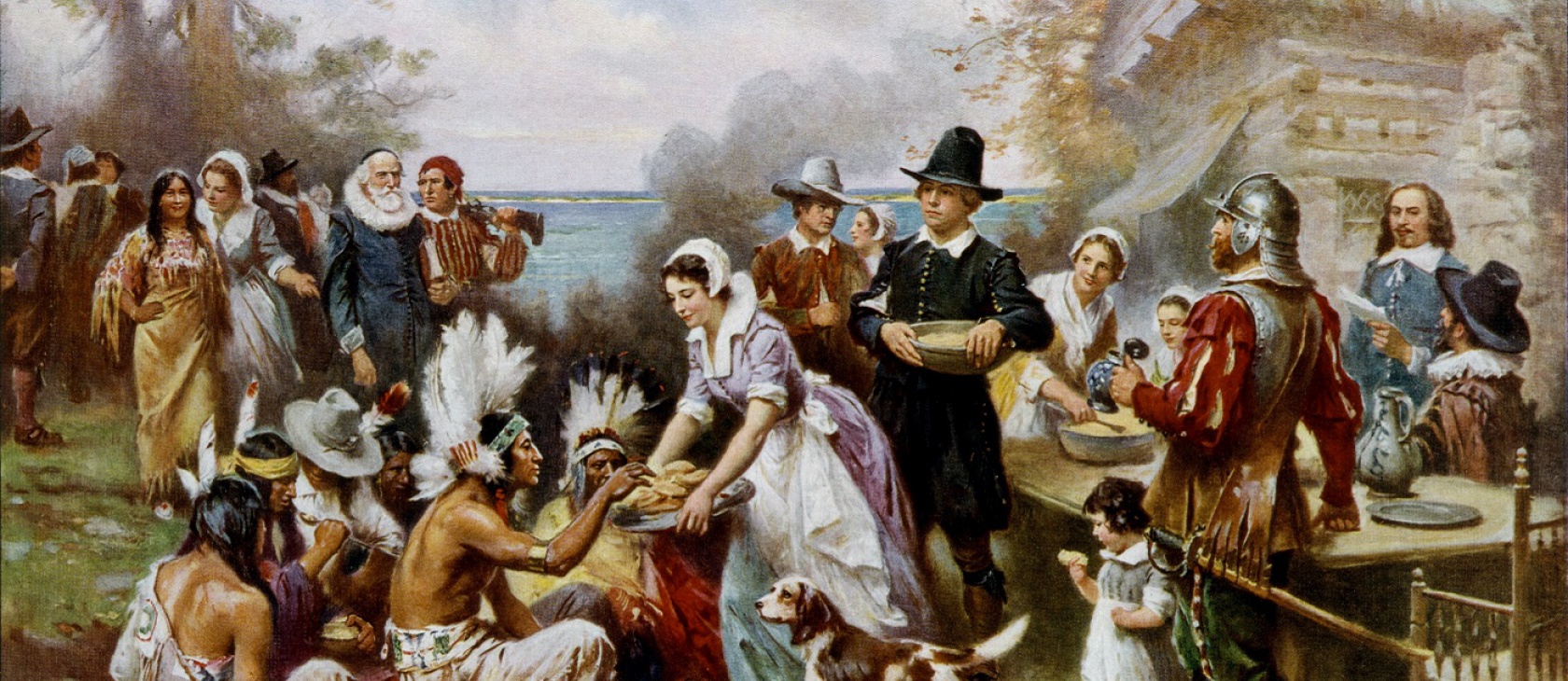By now the Pilgrims’ disastrous experiment with collectivism in Plymouth, Massachusetts, is well-known, in free market circles if not among the young. The story has been printed and popularized – Rush Limbaugh even recites it annually on his radio program. However, trade and commerce played another, lesser-known role in the first Thanksgiving – and America’s founding, history, and self-definition.
Public schools still teach the familiar history of Thanksgiving: that American Indians taught starving Pilgrims useful practices like fertilization. A grateful Governor William Bradford called Squanto – an English-speaking Christian emancipated from slavery by Catholic priests – “a spetiall instrument sent of God for their good beyond their expectation.” But he also saw in him a potential trading partner with a desperately needed skill.
“At the beginnings of the system that we today know as capitalism, the Pilgrims were true economic pioneers,” wrote Peggy Baker, director emerita of the Plymouth Hall Museum. “Their adventure was one of spirituality, of settlement, and of finance.”
The Pilgrims had financed their voyage with a loan provided in London. They hoped to procure enough beaver pelts to make a tidy profit, selling them to make felt hats in England. During the first meeting in 1621 at Patuxet, the Pilgrims asked Samoset to provide them “with such Bevers skins as they had to trucke.”
History – call it Providence if you wish – welded the two groups together on the firm basis of “self-interest on both sides.” The Pilgrims were ill-fit to trap beavers. William Wood wrote in 1634 that “the English … seldom or never kills any of them, being not patient to lay a long siege or to be so often deceived by their cunning evasions, so that all the beaver which the English have comes first from the Indians, whose time and experience fits them for that employment.” Meanwhile the Wampanoag tribe, decimated by sickness and outnumbered by the enemy Narragansett and Pequot tribes nearly 10-to-one, sought a military alliance with settlers owning superior weaponry.
The deal was struck. The Wampanoags provided pelts in exchange for grain, metal objects, and finished clothing; the Pilgrims then sold these to British traders. Bradford estimated the sale of pelts to England between 1631 and 1636 at £10,000. Each side pursued its comparative advantage and traded harmoniously to survive in an environment that threatened both. Their mutual defense and reciprocity pact assured peace for decades, proving out Bastiat’s contention that “men's interests, when left to themselves, tend to form harmonious combinations and to work together for progress and the general good.” Conversely, historians cite the desire to restrict the tribes’ beaver trade as a trigger for later hostilities.
The mutually beneficial trade had a greater impact beyond avoiding conflict with the Wampanoags. It convinced others back home that trade could make North American colonies economically viable. This led to the founding of the Massachusetts Bay Colony which, British author Nick Bunker explained, sought to expand this “business model” on a larger scale, beginning with the founding of New Boston in 1630. The more trade-friendly colony soon had three-times as many members as the older Plymouth colony.
When the Long Parliament of 1640 gave Puritans new power in England and stanched the flow of the Great Migration, Massachusetts responded by fully embracing commerce. “New Englanders did not abandon the entire notion of state oversight of the economy in the light of the experiences of the 1620s and 1630s,” wrote Margaret Ellen Newell, a history professor at Ohio State University, in her book From Dependency to Independence: Economic Revolution in Colonial New England. “Instead, they shifted the emphasis of government involvement from restriction to promotion of trade.” Some of these reforms reduced government intervention. In the 1640s, Massachusetts repealed a law capping interest rates at eight percent, began enforcing contracts more strictly, and rescinded early consumer protection measures. Other measures, like state subsidies, made cronyism a persistent problem.
It could not “be imagined, that this Wilderness should turn a mart for Merchants in so short a space.”
Under the new policy outlook, trade and commerce flourished and, with them, the colonists. Historian Edward Johnson could write in 1654 that the Lord had blessed “this Commonwealth abundantly beyond all expectation in all sorts of needful occupations.” Many had worried Massachusetts would not continue as a “place of continued habitation for want of a staple-commodity, but … in a very little space, everything in the country proved a staple-commodity: wheat, rye, oats, peas, barley, beef, pork, fish, butter, cheese, timber, mast, tar, sope, plank-board, frames of houses, clabboard, and pipestaves, iron and lead is like to be also.”
Whereas the Puritans were “formerly forced to fetch most of the bread they eat, and beer they drink, a hundred leagues by Sea,” by his day they exported goods to their “elder sister, Virginia” and “even the firtil Isle of Great Britain; beside Portugal hath had many a mouthful of bread and fish from us, in exchange of their Madeara liquor, and also Spain.”
It could not “be imagined, that this Wilderness should turn a mart for Merchants in so short a space,” Johnson wrote.
By the time the two colonies were combined as the Province of Massachusetts Bay in 1692, trade and commerce had created a durable colony, assuring the survival of the Pilgrim experiment. The Puritans’ romanticized role in America’s founding would give the nation the tradition of Thanksgiving and may be, at least in part, responsible for its status as the most religious nation in the West. And John Winthrop’s description of the colony as “a shining city upon a hill,” echoing down through the words of a patriotic (and Calvinist) president, continue to shape America’s global image as an inviting beacon of liberty, faith, and human rights – the intangibles that underlie the prosperity we pause to celebrate every Thanksgiving.




